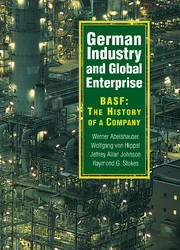Book contents
- Frontmatter
- Contents
- Introduction by the Editor
- I Becoming a Global Corporation – BASF from 1865 to 1900
- II The Power of Synthesis (1900–1925)
- III From the IG Farben Fusion to the Establishment of BASF AG (1925–1952)
- IV BASF Since Its Refounding in 1952
- Appendix Trade Volume and Profits of BASF since its Founding in 1865
- Bibliography
- Index of Archives
- Index of Corporations
- Index of Persons
- Index of Products and Processes
- Subject Index
- Plate section
Introduction by the Editor
Published online by Cambridge University Press: 25 July 2009
- Frontmatter
- Contents
- Introduction by the Editor
- I Becoming a Global Corporation – BASF from 1865 to 1900
- II The Power of Synthesis (1900–1925)
- III From the IG Farben Fusion to the Establishment of BASF AG (1925–1952)
- IV BASF Since Its Refounding in 1952
- Appendix Trade Volume and Profits of BASF since its Founding in 1865
- Bibliography
- Index of Archives
- Index of Corporations
- Index of Persons
- Index of Products and Processes
- Subject Index
- Plate section
Summary
FROM NEW INDUSTRY TO THE NEW ECONOMY
The corporate history of BASF (Badische Anilin- & Soda-Fabrik, founded in 1865), spans an era of German and international economic history that began with the rise of the “new industries” as of the late nineteenth century and continues today in their confrontation with the new economy. BASF is one of the pioneers of that “second economic revolution,” whose significance in the eyes of Douglass C. North, a founding father of New Institutional Economics, far surpasses that of other economic turning points such as the Industrial Revolution. Ever since BASF was created in the midst of this revolutionary upheaval, it has had a hand in actively laying the groundwork and shaping the conditions of this stage of western economic life. The company embodies a special symbiosis between business and scientific research, one that has constituted the essence of economic value-added – and not only at BASF – from the outset but also increasingly in the economy at large.
The new industries of the late nineteenth century long ago became mainstays of the German economy. They now determine the tempo of growth, sustain the labor market, and influence what happens on the stock market. They are responsible for the leading role of exports as well. It is certainly no exaggeration to say that the future of the German economy (and many others) in the postindustrial age depends on the fate of these industries and on their competitiveness on the world market.
- Type
- Chapter
- Information
- German Industry and Global EnterpriseBASF: The History of a Company, pp. 1 - 4Publisher: Cambridge University PressPrint publication year: 2003



